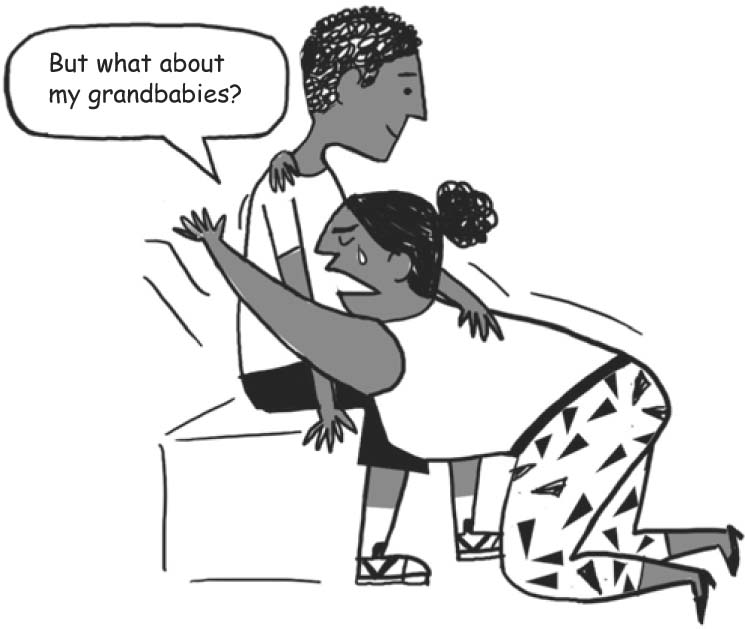Queer (5 page)
Authors: Kathy Belge

If your parents react badly, it's likely because they are a little scared and just looking for a way to understand what's happening. It may feel a little annoying to have to take care of their needs at a time when you're going through so much yourself, but if there's any way you can help them (short of pretending you're someone else!), try to do it. For instance, maybe you can suggest they talk to other gay-friendly people in the family or gay friends or neighbors.
Also, try to stay calm and offer to answer any questions they may have as best you can. Here are some things they may ask.
Are you sure?
How do you know?
Is it a phase?
What about grandchildren?
But then why did you date (insert opposite sex person's name here) last year!
What did I do wrong?
Are you just saying this because we won't buy you a new laptop for your birthday?

Let them know that times have changed and being gay doesn't necessarily mean that you're going to be the last kid picked for kickball anymore or that the football players are going to shove you into the lockers. Plenty of LGBT kids and adults are doing just fine in the world. Just look at Ellen DeGeneres, T. R. Knight, and Clay Aiken. If your parents are politically and socially conservative, you may want to point out that former Vice President Dick Cheney's daughter Mary is an out lesbian who has her father's support, or that both Republican Sen. John McCain's wife Cindy and daughter Meghan are activists for same-sex marriage. Do some research beforehand (see our Resources section in the back of the book) and be ready to give your family a list of recommendations to help them educate themselves.
And if your parents are just losing it, suggest that you continue the conversation when everyone's had time to digest your announcement. They may need to go talk amongst themselves for a moment or express their emotions to an uninvolved friend. Giving them space shows that you're mature enough to handle the whole coming out thing.
Some parents get
really
upset when they find out their kid is gay, lesbian, bi, or trans. Like realty upset. So as lame as it is that you even have to think about this, you may want to devise a little backup plan if things don't go so well and you need a quick getaway. Hopefully your parents aren't going to turn into giant homophobic Transformers and blow up the world when they hear you like other girls or guys, but better safe than sorry. Is there someoneâa best friend, an aunt, your taekwondo teacherâwho you could stay with for a while or who could offer you some support? We don't want to make you all worried, but if you do decide to spill your gay guts to your parents, weaving yourself a safety net might make you feel more secure.
No matter how your parents react, you should be prepared for things to be a little different around the house for a while. Some parents will act like nothing has happened and hope that it will all go away. Others might act overly nice to show how accepting they are. Others may not look you in the eye for a while, or try to do things to get you to change. They might think they did something wrong that caused you to be gay. (There are actually still people out there who believe a domineering mother or absent father can "turn" people gay!) You might have to renegotiate things like hanging out with friends or having friends in your room. Try to be patient. It probably took you awhile to realize and accept that you are queer, and it's probably also going to take your parents some time to get used to the idea.
2010
MILITARY BRASS
Even though the military needs every good soldier it can get, it has been banning gays from serving since 1916. In an effort to protect gays from being discharged, President Bill Clinton instituted a policy known as Don't Ask, Don't Tell in 1992. The military was not supposed to ask, and soldiers weren't supposed to talk, about a soldier's sexual orientation. But still, military "witch hunts" continued, and more than 13,000 service members have since been discharged for being gay. Besides that, the policy unfairly kept queer soldiers in the closet. Fed up with having to live a lie, Lt. Dan Choi came out on a TV news program on March 19, 2009. Despite being a West Point graduate and Iraq veteran who is fluent in Arabic (he was one of only eight soldiers from his graduating class who majored in Arabic), he was
still
discharged. Choi has since become an advocate for LGBT rights in the military, and others, including some politicians, have since joined the fight to change the situation, knowing that being a good soldier has nothing to do with one's sexual orientation.
What if your parents question you about your sexual orientation or your relationship with your girlfriend or boyfriend before you are ready to talk about it? Do you
have
to tell them everything? Not if you don't want to. It's a good idea to let your parents know where you are when you go out so they can be sure that you're not in any danger. But that doesn't mean you need to tell them that you are LGBT until you are ready. So if you are still feeling protective about your new identity, do your best to gently deflect questions that feel too invasive. That being said, people often ask about things because they're ready to listen to the answer. If they're asking in more of a curious way than in a hostile way, it might be a good opportunity for you to talk to them about it.

Sometimes you don't have the luxury of telling your parents you're gay or trans; they find out without your help. Maybe you're spotted holding hands with or kissing your boyfriend or girlfriend. Or maybe your mom finds text messages about your last date or your gym teacher calls home and asks one of your parents why you are binding your breasts. May be your dad finds some of your magazines, and they're pretty obviously for a queer audience. If something like this happens to you, it's totally normal to feel upset and even betrayed. But knowing that your reaction is normal probably won't help as you sit at your kitchen table, listening to your parents say, "Is there anything you need to tell us?" It probably wasn't your plan to come out to your parents in this way, but there's nothing you can do about it now.
If you were planning on coming out anyway, this might be a good time to do it, particularly if your parents are acting more curious and compassionate than angry and hysterical. Of course, if you feel you need to protect your safety, either physical or emotional, it's OK to be evasive. Tell your parents you were just joking or it must have been someone else's. If that doesn't work, resort to your backup plan (see
[>]
).
Sometimes when you come out to your parents, they'll ask that you not tell other members of your family or the neighbors until your parents have had time to think. If you've already told other family members, you should let your parents know and then offer not to spread the news any further until you and your parents can talk more. That way they won't feel ganged up on.
But you need to set clear limits on their coming out moratorium. If your parents never give you the go-ahead to tell other people, you could wind up still being stuck in the closet 15 years down the road, unable to tell your grandmother about your life partner or bring a date to big family events. That's not going to feel good to anyone, including your future partners. So it's good to give your parents a little time to get accustomed to the ideaâbut not a whole lifetime.
So you've come out to your parents, and they're not willing to accept it. It can be frustrating to live in a situation where you feel you don't have the freedom to be yourselfâto date who you want, to wear the outfits you want, to hang out with your friends, or simply to talk, walk, and express yourself in your natural way. But they are still your parents, and they still have power over you. What do you do?
Sometimes it just takes parents awhile to get used to things. Let them sit with the information for a bit before you start asking their permission for things that make them uncomfortable. Then slowly reintroduce the idea by letting them know about someone you like or a date you'd like to go on and see if, over time, they become more permissive.
If they don't, remember that straight teens find ways to spend time together even if their parents disapprove. Your parents may have even had to sneak off when they were teens to meet the person they liked. Of course, if your parents are really strict, you may just have to wait it out. Eighteen may seem like an eternity away, but eventually you'll get there and then you can make your own decisions. Living your life in secret (or not really living it at all) can be frustrating, but don't make any rash decisions. A restricted life at home may be bad, but life on the streets is certainly no picnic.
Should you or shouldn't you come out at school? Will everyone laugh at you? Or will they just shrug and say, "Yeah, so?" Sometimes it's hard to say. Here are some things to consider before you come out.
 Is your school a place you'd feel comfortable coming out?
Is your school a place you'd feel comfortable coming out?
Some schools are certainly more liberal (and safer) to come out in than others. While it's important that you don't have to live in secrecy, it's more important that you actually live through high school. See if you can find other LGBT allies at school, and weigh your options accordingly. Who do you want to come out to?
Who do you want to come out to?
Even if you only come out to one person, and even if he or she seems trustworthy, there is always a chance that you might be outed to the whole school. Make sure you can really trust the person you tell to keep a secret or that you're ready for everyone to find out. Are you ready to handle some rejection?
Are you ready to handle some rejection?
It's freeing to come out âwho doesn't want to live authentically? âbut you should be prepared for some rejection and maybe even harassment. Your friends might get weird after you tell them. They may be afraid that people will judge them for being friends with you, or they may even think you will now start coming on to them! In most cases, people just need time to process it all, but sometimes you will lose someone close to you. Of course, you might not want a friend who won't accept you, but at the same time, it can be hard to lose all of your friends at once, which does happen for some people. So it's an important thing to consider.